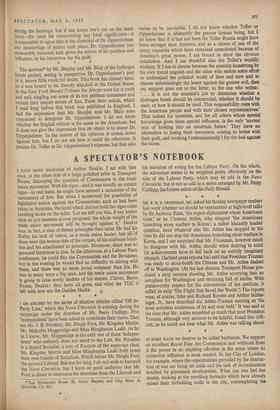A SPECTATOR'S NOTEBOOK
I HAVE MANY memories of Arthur Deakin. I sat with him once, at the other side of a large polished table in Transport House, discussing the question of Communists in the trade union movement. With his cigar—and it was usually an outsize cigar—in one hand, he might have seemed a caricature of the caricatures of him. But when I mentioned the possibility of legislative action against the Communists, such as had been taken in Australia, the hand which did not hold the cigar came crashing down on the table. `Let me tell you this, if any action such as you mention is ever proposed, the whole weight of the trade union movement will be brought against it.' Deakin was, in fact, a man of firmer principles than most. He had his faults, his lack of vision, as a trade union leader, but all of them were the reverse side of his virtues, of his stubborn loyal- ties and his attachment to principle. Moreover, there was no personal bitterness in him. In the afternoon, at a Labour Party conference, he could flay the Communists and the Bevanites: but in the evening he would find no difficulty in mixing with them, and there was no more jovial company than his. He was in many ways a big man, and the trade union movement is going to miss sorely leaders of his stature. Citrine, Bevin, Evans, Deakin : they have all gone, and 'what the TUC k left with now are the Geddes Hacks. At * * •










































 Previous page
Previous page